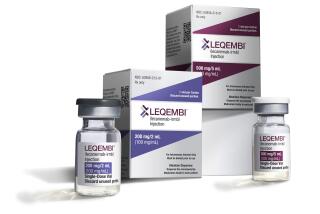New Drug for Parkinson’s Patients Wins FDA Approval
- Share via
WASHINGTON — A new drug that is expected to significantly increase the quality of life for those Parkinson’s disease patients for whom standard drug therapy has begun to fail has been approved for marketing, the Food and Drug Administration announced Wednesday.
The new drug, selegiline, would be added to levodopa, the drug most frequently prescribed to combat symptoms of the degenerative central nervous system disorder, which include slowness of movement, muscular rigidity and an instability that often leads to falls. At the present time, when levodopa’s effectiveness begins to fade, the symptoms return or higher doses of levodopa are needed to suppress them, frequently with increasingly serious side effects.
“The approval of this new drug is significant for 20,000 to 50,000 persons, mostly over 40, who have severe Parkinson’s,” FDA Commissioner Frank E. Young said in a statement. “ . . . We are pleased that this therapy can be approved in full.”
Charlotte Drake, executive director of the Parkinson’s Education Program, a Newport Beach-based international organization that represents 450 support groups in the United States and in 16 countries, said her organization was “absolutely delighted” that the drug had been approved for marketing.
“It doesn’t help everyone with Parkinson’s, but it will make a big difference for the percentage that it will help,” she said. “It will make a big difference in their life style, in that they can continue to live a more normal life. They will not be as impaired by the disease as they were prior to taking the drug.”
An estimated 500,000 Americans suffer from Parkinson’s, according to the federal government’s National Institute of Neurological and Communicative Disorders and Stroke. Very few develop serious symptoms before age 40, and the great majority are diagnosed between the ages of 60 and 70.
The drug has already been made available since June, 1988, to about 600 patients with severe Parkinson’s under an FDA “treatment IND” (for Investigational New Drug) regulation, which allows desperately ill patients to have access to experimental therapies before they are approved.
Parkinson’s disease is believed to be caused by a reduction in the levels of dopamine, a substance produced naturally in the brain, which helps regulate normal movement. The progressive loss of dopamine results in a series of increasingly debilitating symptoms, including the slowing down of all movements, muscular rigidity, difficulty with balance and uncontrollable tremors of the arms. Levodopa enhances the patient’s level of dopamine and improves or eliminates these symptoms in the early stages of the disease.
But problems often occur later, after several years of continued use of levodopa. The effect of the drug begins to wear off, and higher doses are required to achieve the same results. At the same time, higher doses are often accompanied by an increase in side effects, including severe nausea and involuntary bodily movements, flushing, palpitations and confusion.
Selegiline works by inhibiting an enzyme system within the body that otherwise inactivates dopamine. By halting this system, the drug conserves the remaining dopamine produced in the brain as well as that formed from administration of levodopa. In recent clinical trials, patients on selegiline experienced “greater relief of symptoms at the same time as achieving reductions in levodopa use,” the FDA said in a statement.
There are no known major side effects associated with selegiline, the FDA said.
The drug will be distributed under the trade name Eldepryl by Somerset Pharmaceuticals Inc., of Denville, N.J., and will be manufactured in Hungary. Dr. Donald A. Buyske, president of the company, refused to describe its retail cost, saying only that it will be “less expensive” than the major drugs now used to treat Parkinson’s. Further, he said, “with the additional benefits of Eldepryl, patients will be taking lower doses of (levodopa),” he said.
Selegiline was classified by the FDA as an “orphan drug,” a status that enables companies to receive tax and other financial incentives to develop therapies that otherwise might be unprofitable or marginal because of a small market.






